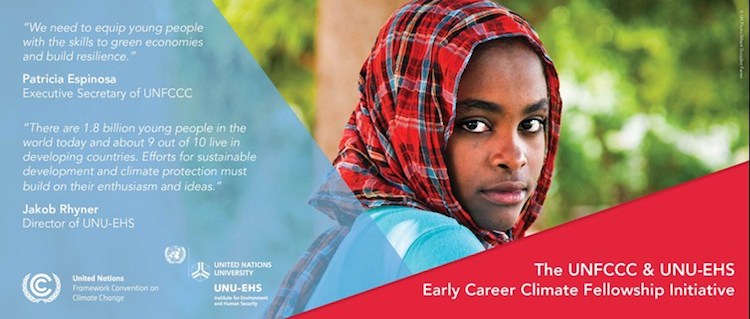BONN (IDN) – Two United Nations agencies, the United Nations Framework Convention for Climate Change (UNFCCC) Secretariat and the United Nations University Institute for Environment and Human Security (UNU-EHS) have launched a significant initiative aimed at preparing young developing country professionals to lead climate action. It will get under way following the UN Climate Change Conference, which runs to May 18.
The fellowship initiative will offer work experience in a vibrant international policy environment at the UNFCCC Secretariat, according to a media release.. The UNU-EHSwill help identify and recruit the young professionals, and provide them with an exciting research environment, the media release added.
The Climate Fellowship initiative is grounded in the recognition that, as UNU-EHS Director, Professor Dr. Jakob Rhyner, said: “There are 1.8 billion young people in the world today, more than ever before in human history, and about nine out of ten live in developing countries.” He added: “Efforts for sustainable development and climate protection must build on their enthusiasm and ideas.”
The UNFCCC-UNU-EHS Early Career Climate Fellowship Initiative offers young people from developing countries a unique possibility to start their career at the interface between international climate policy development and research. In doing so, they will be contributing to the implementation of the Paris Climate Change Agreement and the UN’s Sustainable Development Goals.
Fellowships may last from six months to two years and the work experience with the UNFCCC will be tailored to fit the specific skills and backgrounds of each fellow. Upon completion of the scheme, the “Early Career Climate Fellows” will be able to work in their home countries or internationally, deploying the valuable experience and insights they have gained in Bonn.
UNFCCC Executive Secretary Patricia Espinosa said: “Young, qualified professionals from developing countries represent one of our best resources for building capacity for climate action. As we move with determination into the new era of implementation of the Paris Agreement, we need to equip young people with the skills to green economies and build resilience, and this initiative is an example of how organizations can prepare young people for the challenges of the future.”
She added: “We will also be building their skills so they can better secure employment in the work-place. Many of the young people we will be supporting need real-life experience to get on the job ladder. What we are doing is also a living example of Action for Climate Empowerment (ACE) under Article 6 of the original Convention. It ranges from education to training in respect to climate change: So we are securing a great, dynamic human resource and giving back with a positive, empowering experience in partnership with UNU,” she added.
With 197 Parties, the United Nations Framework Convention on Climate Change (UNFCCC) has near universal membership and is the parent treaty of the 2015 Paris Climate Change Agreement. The main aim of the Paris Agreement is to keep a global average temperature rise this century well below 2 degrees Celsius and to drive efforts to limit the temperature increase even further to 1.5 degrees Celsius above pre-industrial levels. The UNFCCC is also the parent treaty of the 1997 Kyoto Protocol.
The mission of the United Nations University Institute for Environment and Human Security (UNU-EHS) is to carry out cutting edge research on risks and adaptation related to environmental hazards and global change. Its experts have recently concluded the largest national household survey into climate change and migration in the Pacific, with the newly-published results providing a valuable insight into the themes of resilience and adaptation.
Groundbreaking research also analyses the interplay between environmental and societal factors in the Mekong Delta, Nepal and Bangladesh. Additionally, through the Munich Climate Insurance Initiative, UNU-EHS experts contribute to the G7 Initiative on Climate Risk Insurance. [IDN-InDepthNews – 16 May 2017]
Photo credit: UNFCCC
facebook.com/IDN.GoingDeeper – twitter.com/InDepthNews

